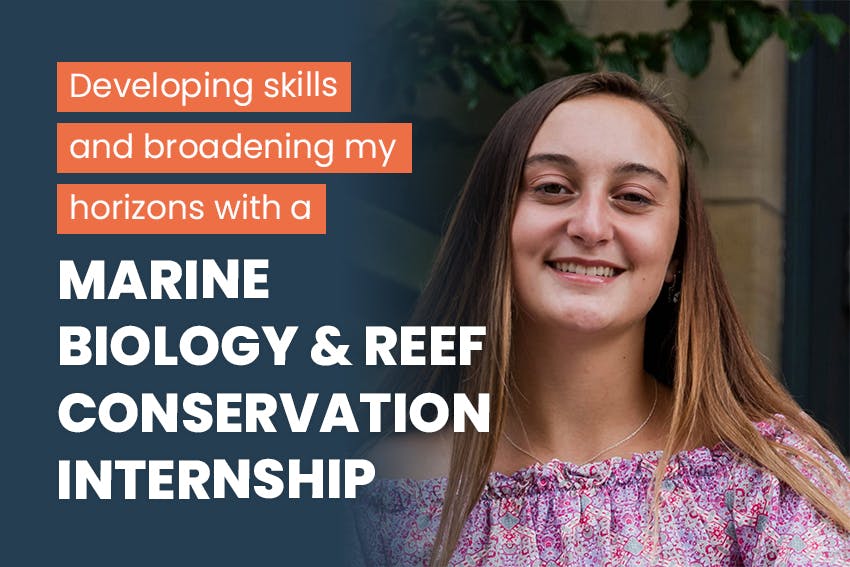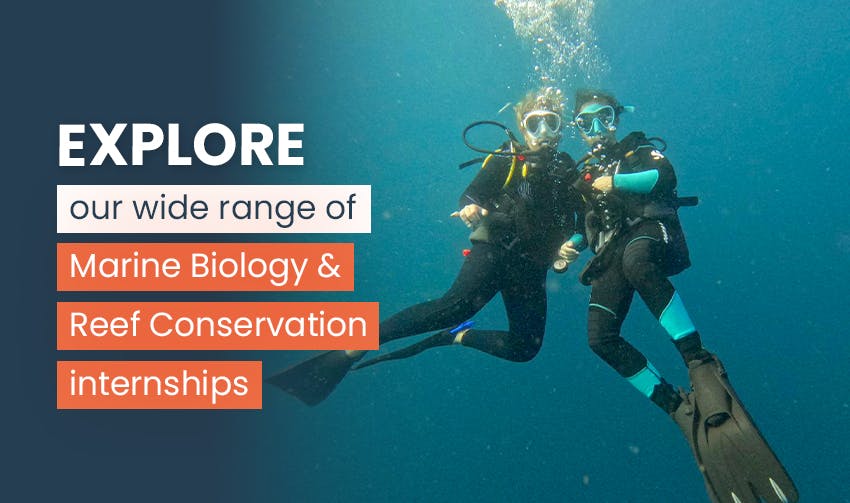
Riley Williams is a Sustainability and Coastal Resilience Major and she is passionate about creating real, visible change in the world. Through interning in the field of sustainability and marine science, Riley’s experience with RISEWAYhelped advance her goals of creating a future career in conservation.
Riley felt that the best way to bring scientific and academic concepts to life was via hands-on learning and field experience, earned outside of a classroom environment. Doing so in a different country allowed Riley to broaden her worldview and develop cultural awareness.
If this sounds in alignment with your interests, read on to check out how the Marine Biology & Reef Conservation internship in Sodwana Bay, South Africa, provided the learning adventure of a lifetime!
Hi Riley! What was your role as a marine conservation intern like?
My role as a Marine Biology & Reef Conservation intern in Sodwana Bay consisted of mainly learning about the environment around me and applying it to citizen science projects, as well as learning how to scuba dive responsibly and safely. I achieved my Open Water Diver certification during my first week in Sodwana and eventually earned an Advanced Open Water Diver certification as well.
I attended a lecture each day on varying marine science topics and gave at least one research presentation each week on a species that I saw during a previous dive.
I scuba dived at least once every week day and took note of the different species of marine life present on each reef, along with their abundance, behavior and relationships with others. After diving each day, I worked with staff to identify different species that we saw on our previous dive, added any megafauna sightings to a log, and submitted any turtle sightings to the Turtle Internet to aid in the tracking of individual specimens.
In total, I completed twenty dives and achieved a maximum dive time of about 65 minutes. The experience that I gained from this internship allowed me to scuba dive safely, correctly, and responsibly, as it also taught me how to identify and observe different marine species within coral reefs both in real time and through video recordings. I gained the skills necessary to identify and record important species within spreadsheets and the Turtle Internet.
How has the Marine Biology & Reef Conservation internship empowered you?
As a sustainability major, I am very focused on climate change and its impacts. The scuba diving certification that I gained during this internship will help me immensely to see first hand the effects of climate change on coral reefs and their inhabitants.
Scuba diving allows for a very in depth experience and helps to build a true connection to the ecosystem and its parts. Through diving and our learnings, I have gotten to see the real beauty that exists here on the reefs and why it is so important to protect. I have learned about the different aspects of the coral reef ecosystem and the organisms and relationships that exist
within it. Through this knowledge and experience, I will be able to apply my skills to aiding in the conservation of coral reefs in the future.

I feel more empowered in my professional life after completing my internship because of the many lessons and skills that I gained along the way. Now, I have two internationally recognized scuba certifications that will aid me in my future career plans and will boost my credibility in my chosen field. I learned the importance of cultural competency both on a personal and professional level and this has given me the confidence to bring this towards my future employer.
From here, I will be continuing to pursue my degree in Sustainability and Coastal Resilience at University. Achieving this degree will allow me to pursue research and analysis about climate change and other aspects within sustainability.
I plan to pursue more internships that align with my goals as a student, worker, and steward of the earth. I will be working with my professor to create a research project to begin in the coming year and plan to publish a scientific journal with him, which will gain me even more credibility for future scientific endeavors. Overall, I am very excited to keep learning and I can’t wait to hit the ground running!
What was the living and social environment like, at the internship camp site?
Everyone at the camp and in the community was incredibly kind and welcoming, from the moment of my arrival.
At first, I felt a bit lost and unsure of myself and my surroundings. I was challenged in social ways, like understanding different accents and customs. When I first arrived, I struggled a bit to understand South African accents, but eventually, I gained a better understanding of it the more that I heard it. After a couple of days of getting to know everyone, things felt much easier!
I also struggled a bit to adjust to the way of life as it is much more laid back than the one that I know back home. Things were much less punctual and much more relaxed in general, which helped me to let go of some anxieties that I had had initially about the program. I got very comfortable once I got to know everyone.
I made some great connections with camp members and truly enjoyed my experience both in and out of the water. The most memorable moment was when I got to meet new people and members of the community and camp.

What was it like doing an internship in a multicultural environment?
Multiculturalism was very prevalent in my internship. I lived with many different people from different parts of the world who have different life experiences. Most of the staff are from South Africa and share their customs and values with the interns.
There were also interns from the US, Germany and Italy, which made our time together all the more special and unique. We shared our different values and ways of life with each other and learned more about each other’s culture. Despite our different cultures, it was easy to see that everyone who came to Sodwana had a mutual love for diving, nature and international citizenry. I really enjoyed getting to learn about so many different cultures in one small space.
Do you have any advice for future interns that you’d like to share?
My biggest piece of advice would be to keep a fully open mind. Be ready to feel a bit confused and lost at times, but be willing to learn and ask questions when you may not understand things. There is so much to learn about the world from others with different cultures and life experiences, as long as we are willing to listen and learn. It also helps to be open to learning and making mistakes without any shame. Although mistakes can be very frustrating, they are no reason to prevent your growth and learning as an intern.
Ready to plan your own internship abroad?
Our step-by-step guide on how it works provides you with more information on how to get started. The process is user friendly - just submit your application to get started. It doesn’t cost anything to apply and won’t take more than 5 minutes. However, your formal expression of interest provides the foundation for us to help you take the next steps.

